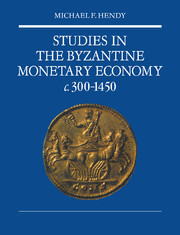Book contents
- Frontmatter
- Contents
- List of plates
- List of maps
- List of tables
- Abbreviations
- Preface and acknowledgements
- Introduction
- SECTION I ECONOMY AND SOCIETY
- SECTION II FINANCE
- SECTION III COINAGE (CIRCULATION)
- 5 Supply
- 6 Supervision
- SECTION IV COINAGE (PRODUCTION)
- Preliminary observations, future directions
- Bibliographies
- Key to plates
- Indexes
- Plate section
5 - Supply
Published online by Cambridge University Press: 05 November 2011
- Frontmatter
- Contents
- List of plates
- List of maps
- List of tables
- Abbreviations
- Preface and acknowledgements
- Introduction
- SECTION I ECONOMY AND SOCIETY
- SECTION II FINANCE
- SECTION III COINAGE (CIRCULATION)
- 5 Supply
- 6 Supervision
- SECTION IV COINAGE (PRODUCTION)
- Preliminary observations, future directions
- Bibliographies
- Key to plates
- Indexes
- Plate section
Summary
CONTROL OF OUTWARD FLOWS
The legislation
Monetarily speaking, the late Roman and – for much of its history at least – the Byzantine empire effectively operated a closed economy. For gold certainly, and silver very probably, this was a matter of law. For copper it seems to have been a matter of practice: because coinage in that metal was almost uniformly of a fiduciary nature, it was normally pointless to export it beyond the imperial frontiers, where its value dropped immediately to that of its bullion content.
The first known step towards the formal establishment of a closed economy of this kind is to be found in a law preserved in the Codex Justinianus:
The same Augusti [Valentinian I and Valens], and Gratian Augustus, to Tatianus, Comes Sacrarum Largitionum
Not only shall gold not be supplied to the barbarians, but even if it is found amongst them it shall be removed by means of subtle ingenuity (subtili ingenio). If, henceforth, gold is supplied by merchants (mercatores) to the barbarians, either for sale (pro mancipiis) or in exchange for whatever kind of commodities (species), they shall suffer not just a fine but an even heavier punishment. And if a governor (index) does not confiscate such gold as is found, he is immediately party to the concealment of a criminal act.
The law is certainly an eastern one, for (Flavius Eutolmius) Tatianus is known to have been comes sacrarum largitionum in the east in 374–8o, and it should therefore be dated 374–5.
- Type
- Chapter
- Information
- Studies in the Byzantine Monetary Economy c.300–1450 , pp. 257 - 315Publisher: Cambridge University PressPrint publication year: 1985
- 1
- Cited by



